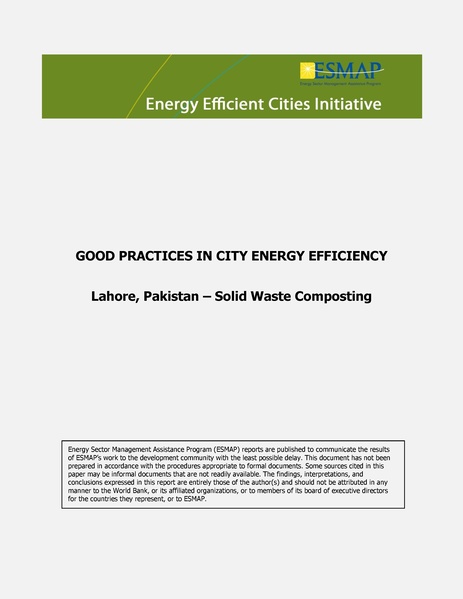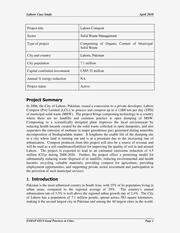Click here to register!
File:Solid Waste Composting in Pakistan.pdf
 Size of this JPG preview of this PDF file: 463 × 599 pixels. Other resolution: 185 × 240 pixels. |
Original file (2,550 × 3,300 pixels, file size: 606 KB, MIME type: application/pdf, 12 pages)
Summary
In 2006, the City of Lahore, Pakistan, issued a concession to a private developer, Lahore Compost (Pvt) Limited (LCL), to process and compost up to a 1,000 ton per day (TPD) of municipal solid waste (MSW). The project brings composting technology to a country where there are no landfills and common practice is open dumping of MSW. Composting in a scientifically designed plant improves the local environment by reducing health hazards created by the solid waste collected in open dumpsites, and also sequesters the emission of methane (a major greenhouse gas) generated during anaerobic decomposition of biodegradable matter. It lengthens the usable life of the dumping site in a city where land is running out and is at a premium due to the increasing rate of urbanization. Compost produced from this project will also be a source of revenue and will be used as a soil conditioner/fertilizer for improving the quality of soil in and around Lahore.
Licensing
| File from an External Source | This file is from an external source. The copyright provisions of the original source apply to this file. Please report copyright infringements to the energypedia team so that it can delete the appropriate files. |
|---|
File history
Click on a date/time to view the file as it appeared at that time.
| Date/Time | Thumbnail | Dimensions | User | Comment | |
|---|---|---|---|---|---|
| current | 16:31, 16 December 2014 |  | 2,550 × 3,300, 12 pages (606 KB) | ***** (***** | *****) | In 2006, the City of Lahore, Pakistan, issued a concession to a private developer, Lahore Compost (Pvt) Limited (LCL), to process and compost up to a 1,000 ton per day (TPD) of municipal solid waste (MSW). The project brings composting technology to a ... |
You cannot overwrite this file.
File usage
There are no pages that use this file.




















